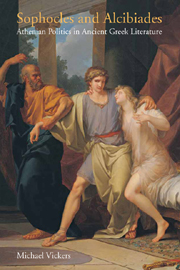Book contents
- Frontmatter
- Contents
- Preface
- 1 The mythologizing of history
- 2 Antigone, Pericles and Alcibiades
- 3 Oedipus Tyrannus, Alcibiades, Cleon and Aspasia
- 4 Ajax, Alcibiades and Andocides
- 5 Philoctetes, Alcibiades, Andocides and Pericles
- 6 Alcibiades in exile: Euripides' Cyclops
- 7 Oedipus at Colonus, Alcibiades and Critias
- 8 Critias and Alcibiades: Euripides' Bacchae
- 9 Alcibiades and Melos: Thucydides 5.84–116
- 10 Thucydides on tyrannicides: not a “digression”
- 11 Alcibiades and Persia (and more Thucydidean “digressions”)
- 12 Alcibiades and Critias in the Gorgias: Plato's “fine satire”
- Epilogue
- Bibliography
- Index locorum
- Index
7 - Oedipus at Colonus, Alcibiades and Critias
- Frontmatter
- Contents
- Preface
- 1 The mythologizing of history
- 2 Antigone, Pericles and Alcibiades
- 3 Oedipus Tyrannus, Alcibiades, Cleon and Aspasia
- 4 Ajax, Alcibiades and Andocides
- 5 Philoctetes, Alcibiades, Andocides and Pericles
- 6 Alcibiades in exile: Euripides' Cyclops
- 7 Oedipus at Colonus, Alcibiades and Critias
- 8 Critias and Alcibiades: Euripides' Bacchae
- 9 Alcibiades and Melos: Thucydides 5.84–116
- 10 Thucydides on tyrannicides: not a “digression”
- 11 Alcibiades and Persia (and more Thucydidean “digressions”)
- 12 Alcibiades and Critias in the Gorgias: Plato's “fine satire”
- Epilogue
- Bibliography
- Index locorum
- Index
Summary
Sophocles' Oedipus at Colonus seems to fall into the same category as the other plays discussed in this book. In the spirit of Wilamowitz, Karl Reinhardt thought that it is “a play … which is careful to avoid all political allusions”, but Lowell Edmunds' view that “the tragedy provides various models of acceptance and reconciliation pertinent to Athens in the aftermath of the revolution of the Four Hundred” in 411 bce is probably closer to the truth. Sophocles died in 406/5 having recently completed the text of Oedipus at Colonus. The play was only actually performed in 401. Oedipus again would appear to “come forward” as Alcibiades, an Alcibiades who had left Athens for the second time in the autumn of 407, never in fact to return. By the time of the likely composition of Oedipus at Colonus he had taken refuge in one of the fastnesses in the Thracian Chersonnese that he had thoughtfully prepared against such an eventuality. Deprived once again of his property in Attica, in the spring of 406 he was in as bad a position as he had been in the autumn of 415.
Sophocles had been a proboulos in 412/11, one of a board of ten appointed from men who were over the age of forty to stabilize the government of Athens in troublesome times. The high age qualification for this office and the lack of any time limit on tenure have been taken to be oligarchical features.
- Type
- Chapter
- Information
- Sophocles and AlcibiadesAthenian Politics in Ancient Greek Literature, pp. 95 - 103Publisher: Acumen PublishingPrint publication year: 2008



